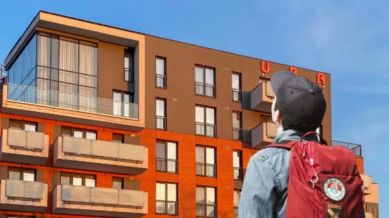Navigating September Intake: Key points for booking student accommodation
To get the best options available, it's wise to start looking for accommodation early. Ideally, you should begin your search about six months before your courses start.

— Madhur Gujar
Choosing the right student accommodation is a crucial part of preparing for university life, especially if you’re gearing up for the September intake.
The place you choose to live can really make a difference in how well you adjust to university life and how successful you are academically.
Studies show that students who settle into comfortable and well-equipped living spaces are more likely to do well in their studies because these environments reduce stress and increase focus.
Understanding the importance of timing
To get the best options available, it’s wise to start looking for accommodation early. Ideally, you should begin your search about six months before your courses start. This early start not only gives you a wider range of options to choose from but also spares you the anxiety of having to make a rushed decision as the term begins. Starting early also means you will have ample time to handle any unexpected issues that might come up during your search.
Here are some key aspects to consider, supported by recent statistics:
Location
The convenience of your accommodation’s location is crucial. On average, students live about 24 minutes from campus, which has remained consistent over the past year. The closer you are to campus, the less time you will spend commuting, giving you more time for studies and campus activities.
According to a survey, 86 per cent of students consider location very important, prioritising proximity to both academic facilities and local amenities.
Safety and security
Safety is a major concern, with 73 per cent of students stating that the security of their accommodation is very important to their overall student experience. Accommodations with CCTV, secure entry systems, and on-site security personnel can provide peace of mind and allow students to focus more effectively on their studies.
Budget considerations
Understanding your budget is essential. In the UK, for example, the average student rent can vary significantly but typically ranges from £125 to £215 per week depending on the location and type of accommodation. It’s important to factor in utilities, internet costs, and additional fees that might not be included in the rent.
Amenities and facilities
Access to good amenities can greatly enhance your living experience. Facilities like on-site gyms, study rooms, and recreational areas are highly valued by students. For example, over 65 per cent of students reported that having communal facilities was a key factor in their choice of accommodation, as these spaces provide both social and relaxation opportunities.
Community and social opportunities
Many students prefer accommodations that offer organised social events, which help in building a supportive community. Engaging with fellow students through these events can be pivotal in developing a network of friends and colleagues, which is essential for mental and emotional support during university life.
Internet access
Given the shift towards more digital learning, a strong and reliable internet connection has become a top priority for students. It’s crucial for accommodations to provide high-speed internet to support online learning and research activities.
Lease flexibility
Flexibility in lease terms can be important, especially in uncertain times. It’s useful to know whether you can adjust lease terms or terminate early without significant penalties. Nearly a third of students have reported needing flexible accommodation arrangements due to changing study conditions.
Common mistakes to avoid when booking student accommodation
Here’s what to watch out for, supported by recent statistics to guide you better:
Not budgeting properly
One of the biggest slip-ups is not setting a clear budget. About 51 per cent of students expressed concerns about the increasing costs of accommodation due to shortages, highlighting the importance of financial planning. Make sure to consider all expenses including rent, utilities, and internet. Misjudging your budget can lead to financial strain that affects your ability to focus on studies.
Skipping the property visit
Many regret not checking out their accommodation in person before signing the lease. Visiting lets you catch issues that aren’t visible in photos — like noise levels or maintenance problems.
Remember, a third of your experience at university will revolve around your home base, so it’s worth taking the time to visit.
Ignoring lifestyle fit
Think about what you need in a living situation. Are you a night owl or an early riser? Do you need quiet to study, or do you thrive in a bustling environment? Ignoring these factors can lead to discomfort and frustration. It’s like wearing shoes that don’t fit — sure, you can walk, but it’s going to hurt.
Overlooking location
A lot of students think they can handle a long commute, but it wears you down. Living far from campus might seem cheaper initially, but consider the transport costs and time. A recent survey found that students value location highly, with 86 per cent prioritising proximity to university over cheaper but distant options.
Skimping on research
Jumping at the first available option without proper research is a common pitfall. Check out reviews, talk to current tenants, and compare several places.
About 65 per cent of students emphasised the importance of thoroughly researching accommodation options to avoid regrets later.
Glossing over the lease details
It’s easy to overlook the details in a lease agreement when you’re eager to secure a spot. However, 30 per cent of students end up misunderstanding the terms of their leases, leading to disputes and extra costs later on. Always read the fine print and ask questions about anything unclear.
The effort you put into choosing your accommodation not only affects your day-to-day comfort but also your ability to thrive at university. Take the time to consider all your options carefully and make informed decisions that will help you enjoy and make the most out of your university years.
(The writer is the Co-Founder and CBO at Amber)